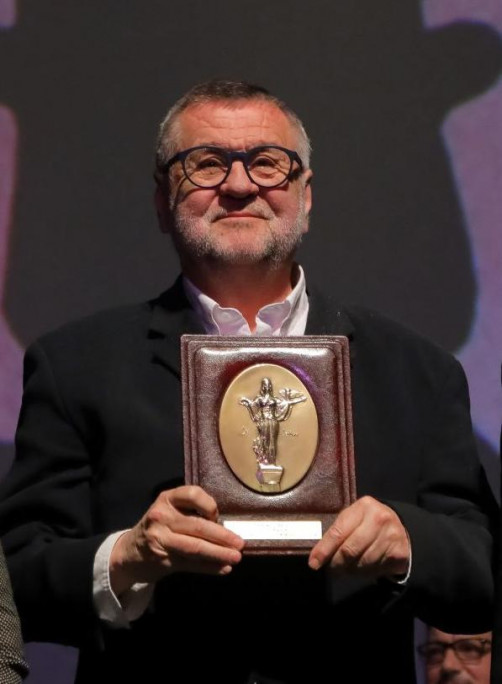"I strive for my films to be as local as possible, to plunge as deeply as possible into our reality, because I believe that is the only way they can be understood – even by someone in Antarctica, for example."
Rajko Grlić
He received his first camera as a teenager for Christmas. At 17, he shot his first film – the short “Brick” (1964), a five-minute work in which a boy and a girl sitting on a park bench are surrounded by a gang of thugs who hand the young man a brick and force him to “buy it” in order to leave him and his girlfriend in peace. Aggression as a social phenomenon would become a central theme for Rajko Grlić, one of the most renowned Yugoslav and Croatian film directors.
Grlić was born in Zagreb, but he studied film directing at the renowned FAMU (Film and TV School of the Academy of Performing Arts) in Prague. He says that these cities have shaped him both as a person and as an artist (although he later also taught in New York and several other prestigious American universities). His father was a famous philosopher, professor, and university lecturer in Zagreb, while his mother was a partisan who, after the end of World War II, entered into a fierce conflict with a State Security officer and was sentenced to three years in prison on the island of Goli Otok. Both of his parents carry Jewish blood, and Grlić shares that there were periods when, precisely because of that, he did not feel secure in his native Croatia. Thanks to his parents, the director has a keen understanding of power mechanisms and how they influence human destinies.
While making his first amateur films (with which he also won many awards), Grlić also performed as an actor in the Student Experimental Theatre, and later he enrolled to study philosophy at the University of Zagreb – thus following in his father’s footsteps. However, he dropped out after just one year – the infection of cinema had already taken hold of him and would not leave him alone.
In the 1960s, a group of young directors from former Yugoslavia studied film at FAMU in Prague, then in Czechoslovakia – Rajko Grlić, Goran Marković, Srdjan Karanović, and Goran Pascaljevic (in the 1970s, Emir Kusturica also graduated from the same academy). When Soviet tanks invaded Czechoslovakia in August 1968, Grlić headed the student workers’ committee at the film academy. Even then, in the late ’60s and later, in the ’70s in collaboration with Srdjan Karanović, he created several documentary shorts and feature films as well as television series, some of which were banned from public screening by the official authorities in Yugoslavia. A similar fate befell perhaps the strongest narrative film of his early career “You Love Only Once” (“Samo jednom se ljubi”, 1981). This love story – something like a “Romeo and Juliet” in Tito’s Yugoslavia – was also “locked up” by the authorities for some time. In it, Grlić worked with one of his favorite actors, Miki Manojlović.
This year’s edition of the Sofia Film Festival will give the audience the opportunity to see three films by Rajko Grlić, created over the past two decades. In all three, we find – in varying proportions and relationships – the director’s recurring themes: power and its absurdly tragicomic finality, the clash between generations and their different perspectives on life and the world, the past and the future, violence as an instinct, sex as everything, as well as the intolerance and oppression of what is different and of those who are different as an insurmountable constant.
In “The Border Post” (2006), a small, quasi-military farce evolves into an absurd tragedy against the backdrop of an anticipated yet never-occurring war. The “Constitution” (2016), subtitled “A Love Story of Hatred”, was received by the European film community as one of the boldest films by the Croatian director. When it hit the screen, far-right political sentiments in Croatia were once again gathering strength and followers. The theme of how minorities are treated – especially members of the LGBT+ community and Serbs – is painfully topical. Grlić’s latest film, “It All Ends Here” (2024), based on works by Miroslav Kırljež, is a co-production between Croatia, Bulgaria, Serbia, and Montenegro (featuring Bulgarian actress Angela Nedyalkova), and at its center is a corrupt lawyer defending a double murderer. Once again, Grlić offers us his cinema – problematic, committed, revelatory, and yet modest in form, seemingly untempted by artistic vanity and far from any sense of self-satisfaction. The major themes of our time (the end of the 20th and the beginning of the 21st century) and of our region (the Balkans) are also the themes of Rajko Grlić.
Irina Ivanova
****
The 29th Sofia International Film Festival in 2025 honored Rajko Grlić with the Sofia Municipality Award for his exceptional contribution to the art of cinema.



